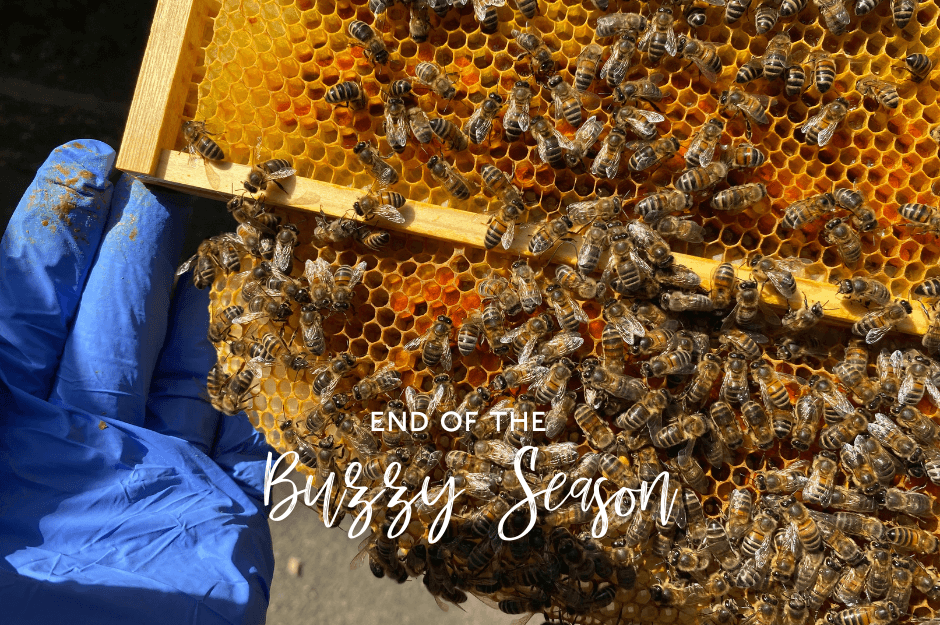End of the buzzy season: what have the bees been up to?

It's been a busy few months for our five colonies of honeybees here at Arena Flowers. They're now coming to the end of their active season, and have been furiously foraging nectar and pollen eat both straight away and preserve for the coming winter. It's not been without its trials and tribulations though... While there has been lots of success, it's not been without it's trials and tribulations.
Initially, all five hives got off to a great start, with each population increasing and workers finding plenty of sources to build up what we call stores. Stores consist of honey (dehydrated nectar) and compacted pollen, and we keep an eye on how full each hive's stores are getting.

These stores were helped initially by the fantastic June weather we experienced. However through July and August, the unseasonably wet conditions caused many forage sources to flower and be over quickly, and a few weeks ago our colonies raided their stores of food.
This is where our weekly checks pay off. We're able to mitigate any problems, taking action where it's needed to keep the honey bees happy and thriving. When we saw how empty each of the stores were, we put either sugar syrup or polline in the hives. Sugar syrup solution is a substitute for nectar (carbohydrate source), and polline is a kind of candied pollen (protein source). These supplement any remaining stores they have left for immediate food, but they can also keep it in the frames to build stores back up.
Each of our five colonies have needed syrup, polline or both over the last few weeks, but thankfully this has reduced the occurrence of queens not laying (sometimes they pause if food is scarce because there isn't enough to go around), and numbers have had a little boost recently, but they're not out of the woods yet.
The hive that only recently superseded the first queen looks like it's about to do the same again with the new one. When inspecting the hives, we have noticed that she had been laying drones - unfertilised eggs. There's a distinct lack of capped worker brood, and we have had a few queen cups charged with royal jelly. Not only that, but all the other hives have recently given their drones the boot for the year - the boys don't get to stay in the warm hive over winter - so why is she laying drones? Together, these are telltale signs that the new queen isn't properly mated and her workers aren't happy about it. It means we may have a new queen on our next inspection, as there was a capped queen cell inside, meaning a larva was pupating.

This brings it's own complications, because the queen will need to mate, but we've just said the other hives have kicked out their drones. With a deficit of males, this new queen may not have anyone to mate with. She won't mate with the drones in her hive because they're her sons. Genetically, they share 100% of her DNA. We'll be carefully managing what happens in this hive to prevent it's loss.
Furthermore, for two weeks one of our hives hasn't had any eggs. At first we thought the queen had merely paused, and then that she had been killed off to be replaced. While planning to merge this hive with another that hasn't built up in numbers as well as the others, we checked every single frame just to make sure she wasn't there. To our surprise, there she was scurrying across a frame. We put our merger plan on hold and will be diligently checking for eggs next time. If no eggs are found we'll continue with joining two of our hives together, which will see them through until next year.
The season's work is not yet done, so watch this space for the final update of the late summer/early autumn before we move on to winter hive management.
Beth is Arena Flowers' Content Editor and part of the Bee Team, learning hive management theory and practice from a qualified beekeeper. To find out more about British honeybees, hive management and where to learn beekeeping visit the British Beekeepers Association website.